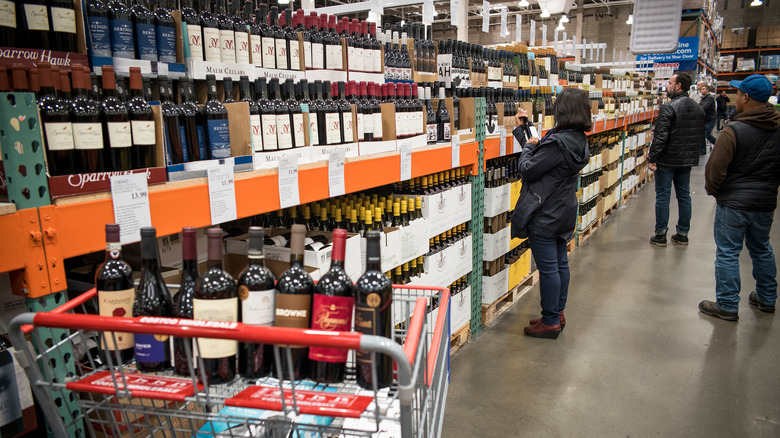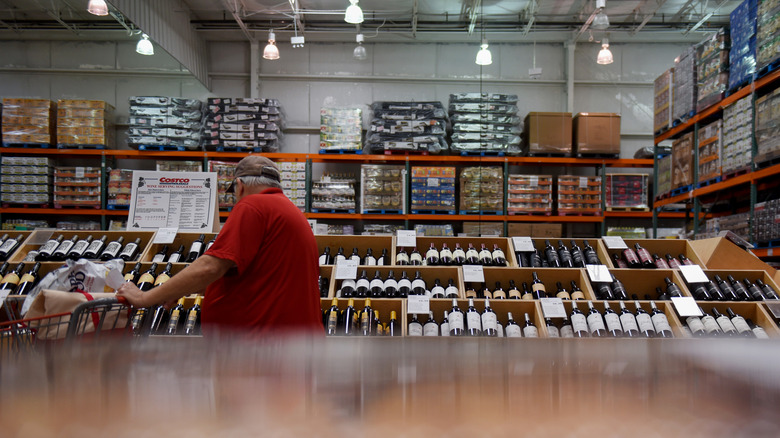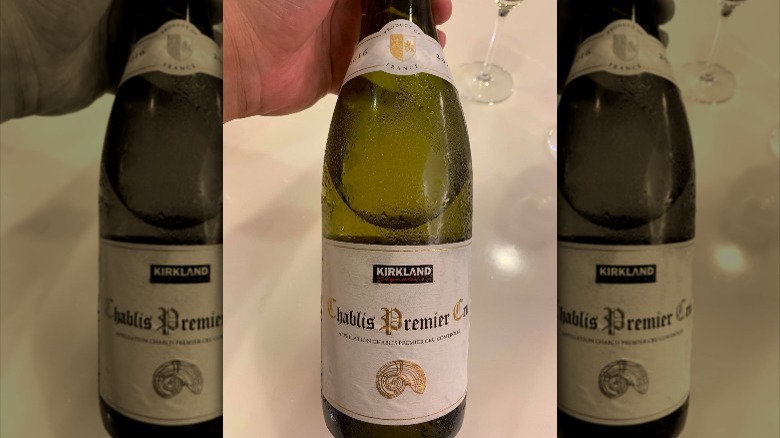The Critically Praised French Wine That Keeps Flying Off Costco's Shelves
The list of benefits to a Costco membership is as long as the line at Costco itself. This concept began in a 1976 San Diego airplane hangar turned Price Club warehouse — the first megastore of its kind — where small business owners saved on wholesale purchases thanks to an efficient business model. Less than a decade later, the original Costco opened up in Seattle, making billions of dollars in annual sales just a handful of years into its existence. By 1993, the two merged into Price Costco (now just Costco) and became the widespread retailer we know today, providing shoppers with affordable, brand-name merchandise sold in bulk quantities. That's all thanks to the buying power provided by Costco's high membership numbers.
Unfortunately for those members, however, Costco subscriptions are going to get more expensive in the near future, according to Costco's CFO (via The Hill). Costco is certainly not alone in this strategy, and the company has historically hiked prices every handful of years, but that doesn't mean it's less scary for consumers, especially given inflation and a looming recession. So, how does Costco make sure it's worth its fees?
Costco wine is a steal
There are countless products and services Costco provides in order to appeal to its members, but one of the most notable strategies it uses is offering wine. Specifically, per Wine Spectator, the company has gotten into selling wine to attract millennial shoppers. Those millennials may respect Costco's corporate philanthropy, fair labor practices, and organic options, but deals on alcohol are what really get that generation to open their wallets. This explains the creation of the business's house wine brand, Kirkland Signature, which provides bottles of wine from on-the-rise regions using unique techniques for a fraction of their market rates. These beverages include standouts such as the Premier Cru, a $15ish bottle of Chablis (the price can vary).
Interestingly enough, though, as Geekspin explains, some Kirkland Signature items are not manufactured by Costco itself. Instead, these products are made by a third party and then later resold under the Kirkland brand name. The Kirkland Chablis Premier Cru is thought to be one of those goods. Its bottle identifies the wine's creator as Odile van der Moere, cellar master at French winery Jean-Marc Brocard. Given the similarity of logos on the Kirkland and Jean-Marc Brocard bottles of Chablis Premier Cru, it seems likely they're both made by Jean-Marc Brocard, with the Kirkland variety simply being sold by Costco. Sorry to dash your hopes that Costco has a vineyard hidden in all those aisles, but don't worry, the Kirkland Chablis Premier Cru is still worth a trip to the store.
What makes Kirkland Signature Chablis Premier Cru special
The Kirkland Signature Chablis Premier Cru may be relatively affordable, but is that the only reason it keeps flying off the shelves? Not quite. According to Tastings — who gave it a gold medal in their review — this wine comes from the Chablis region of Burgundy, France, where a soil rich with clay, limestone, and fossilized oyster shells bestows a flinty taste upon oaked and unoaked Chardonnays, which end up with ageable, concentrated, and steely flavors.
The Kirkland Signature Chablis Premier Cru wine in particular is fruity, juicy, oaky, and smooth. It smells and tastes of toasted crumpet, spiced mango, nutty basmati rice, and candied lemon, and it also carries crushed mineral and spiced poached pear flavors in its dry, balanced body. While the wine can be enjoyed on its own, Tastings recommends pairing it with dishes like barbecue chicken, chicken fajitas, and pad Thai chicken.
Tastings is not alone in its praise for the Kirkland Signature Chablis Premier Cru. As recently as 2020, the Seattle Times highly recommended it as one of the best Costco bargain wines, noting its cellaring potential, delicate palate, and enduring aftertaste. Food critic Tan Vinh even claimed that it tied for best Costco wine of that year, emphasizing that it tasted as good as another Chablis that cost over twice as much more. Critics love it, shoppers buy it, and Costco sells it. Everybody wins!


